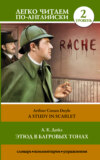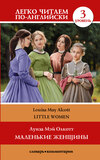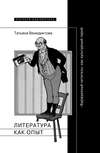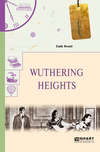Czytaj książkę: «Сборник лучших произведений английской классической литературы. Уровень 3»
© Демидова Д.А.
© Прокофьева О.Н.
© ООО «Издательство, АСТ», 2021
Charlotte Brontё
Jane Eyre
Chapter 1
It was impossible to take a walk that day. Since dinner the cold winter wind had brought with it clouds so sombre, and a rain so penetrating, that further out-door exercise was out of the question. Instead, we had to amuse ourselves indoors1. I was glad of it: I never liked long walks, especially on chilly afternoons. My cousins, Eliza, John and Georgiana Reed were sitting round their mama in the drawing-room by the fire-side, but I was not allowed to join the group.
“You, Jane, are excluded from our company until I hear from Bessie that you can behave like a proper, sweet little girl,” announced Mrs. Reed.
“What does Bessie say I have done?” I asked.
“Jane, I don't like questioners; don't answer me back2. Be seated somewhere; and until you can speak pleasantly, remain silent.”
I went into another room, with a bookcase in it. I took one of the books, Bewick's History of British Birds, and climbed into the window seat. I drew the curtain, gathered up my feet, and sat cross-legged, like a Turk. Then I immersed myself into another world. I was now discovering the shores of Lapland, Siberia, Spitzbergen, Nova Zembla, Iceland, Greenland, with 'the vast sweep of the Arctic Zone, and that reservoir of frost and snow. Of these death white realms I formed an idea of my own: shadowy, like all the half-comprehended notions that float dim through children's brains, but strangely impressive.
The book contained pictures, and each picture told a story. These stories were as interesting as the tales Bessie sometimes told us on winter evenings when she was in good humour.
With Bewick on my knee, I was then happy: happy at least in my way. I feared nothing but interruption, and that came too soon. The breakfast-room door opened.
“Boh!” cried the voice of John Reed. Then he paused as he thought the room was empty. “Where is she? Lizzy! Georgy! Tell Mama! Jane's run out into the rain!”
“She's in the window seat,” Eliza said at once.
I came out immediately before John could drag me out.
“What do you want?” I asked.
John Reed was a fourteen-year-old schoolboy, four years older than I. He was large and stout for his age, and he bullied me continually. I hated and feared him, I could do nothing against him. The servants did not like to offend their young master, and Mrs. Reed was blind and deaf on the subject.
All at once, without speaking, John struck suddenly and strongly
“That is for your rude answer to mama, for hiding behind curtains and for the look you had in your eyes, you rat,” he said.
“What were you doing behind that curtain?”
“I was reading.”
“Show me the book.”
I gave him the book.
“You have no right to take our books. You have no money, your father left you none, you should beg, and not live with us. Now, I'll teach you a lesson. Go and stand by the door.”
I did so, then waited, flinching. He hurled the heavy book at me. It hit me and I fell, striking my head against the door and cutting it. The cut bled, the pain was sharp: suddenly my terror was gone, and I was full of anger.
“Wicked and cruel boy! You are like a murderer!”
“Did she say that to me? Did you hear her, Eliza and Georgiana? Won't I tell mama? but first-“
He grasped my hair and my shoulder. I don't very well know what I did with my hands, but he called me 'Rat! Rat!', Eliza, and Georgiana ran for Mrs. Reed.
We were parted, and Mrs. Reed was standing over me.
“Dear, dear,” said Abbott, shaking her head. “What a fury, to fly at master John!”
“Take her away to the red-room,” said Mrs. Reed, “and lock her in there.”
The red-room was the biggest bedroom in Gateshead Hall, with a red carpet, red damask drapery, red velvet curtains, and a dark mahogany bed in it. Nobody slept there. Nobody wanted to. It was here, nine years before, in that very bed that Mr. Reed had died. Ever since I had often heard the servants whispering that it was haunted.
I resisted all the way. Bessie and Abbott had to force me through the door. I only stopped struggling when they threatened to tie me to a chair.
“What shocking conduct, Miss Eyre, to strike a young gentleman! Your young master.”
“Master! How is he my master? Am I a servant?”
“No; you are less than a servant, for you do nothing for your keep,” said Miss Abbot.
“Miss Eyre, you should be grateful to Mrs. Reed for keeping you,” said Bessie, in a kinder voice. “If you don't behave, she might send you away3, and then where would you be?”
“You'd better say your prayers, Miss, and ask for forgiveness,” said Abbott.
They left and locked the door behind them.
Left alone, holding furiously onto the chair I had been pushed into, I turned the afternoon's events over and over in my mind4. Why did everyone adore selfish, rude John, Georgiana and Eliza, and hate me, even though I tried to be good? Was it because they were pretty, with their golden curls and silk dresses, and I was poor and plain? “Unjust! – unjust!” said a voice in my head.
The room was silent as it was far from the nursery and kitchen. It was getting dark as the daylight faded and I had no candle. It was cold too as there was no fire. I thought about Mr. Reed. He had been my uncle-my mother's brother. When my parents had died, I was a baby, and my uncle Reed had brought me to live at Gateshead Hall. Bessie had told me that Mrs. Reed only continued to look after me because, just before his death, Mr. Reed had made her promise that she would.
He had always been kind to me. Perhaps now his spirit was watching5, and was angry about the way they treated me. Perhaps-I gripped the chair more tightly, and felt frightened-perhaps his ghost really lived in this room.
The thought of seeing a ghost, even kind Mr. Reed's ghost, filled me with terror. I was not quite sure whether Abbott and Bessie had locked the door; I got up and went to see. Alas! yes. I stared into the darkness in panic, convinced a phantom was about to appear.
At this moment a light gleamed on the wall and began to glide slowly across the ceiling towards me.
Looking back, I know it was probably nothing more than a footman carrying a lantern across the lawn6. But, in my terrified state of mind, I believed it was the ghost. My head grew hot, something seemed near me. I rushed to the door and shook the lock in desperate effort screaming.
I heard footsteps, the key turned, Bessie and Abbot entered.
“Take me out! Let me go into the nursery!” I cried.
“What for? Are you hurt? Have you seen something?” demanded Bessie.
“I saw a light, and I thought it was a ghost…”
“What is all this?” It was Mrs. Reed. “Bessie, I told you to leave Jane alone.”
“Miss Jane screamed so loudly, ma'am…”
“You cannot get out by these means, child,” Mrs. Reed said. “It is my duty to show you that tricks will not work. You will now stay here an hour longer.”
“O aunt! have pity! Forgive me!”
But I was only an actress in her eyes. Bessie and Abbot left first, Mrs. Reed pushed me back into the room and locked me in.
Left alone once more, I fell unconscious, as that was the last thing I remembered.
Chapter 2
When I woke up, I was somewhere warm and soft. There was a red glow and muffled voices around me. Someone lifted me, and then I rested my head against a pillow or an arm.
When I opened my eyes, I saw that I was in my own bed. The glow came from the fire. It was night. Bessie stood beside me, looking anxious, and a gentleman sat in a chair near my pillow. I knew him. It was Mr. Lloyd, an apothecary. Mrs. Reed called him sometimes when the servants were ill.
“Who am I, Jane?” he asked.
“Mr. Lloyd,” I said, offering him at the same time my hand. He took it and smiled.
“I think she'll be alright. I'll come back tomorrow.”
He departed, to my grief. I felt so sheltered when he sat in the chair, and then all the room darkened.
“Would you like to sleep, Miss Eyre?” asked Bessie, rather softly.
“I'll try.”
“Would you like something to eat or drink?”
“No thank you,” I said, puzzled7. Why was she so nice to me?
“Then I'll go to bed myself-it's after midnight,” she said. “But you can call me if you want anything.”
“Bessie, what is going on?” I asked. “Am I ill?”
“You fainted crying in the red-room. You'll be better soon.”
Next day I sat wrapped in a shawl by the fire. I felt weak and broken down. None of the Reeds were home, and I could be happy. Instead, my nerves were in such a state that no calm could soothe, and no pleasure excite them. Even when Bessie came in with a tart for me, I put it away. As Bessie finished dusting and tidying the room, she began making a new bonnet for Georgiana's doll and sing. Her voice was sweet but I found its melody sad.
“Why did they send me
so far and so lonely,
Up where the moors spread
and grey rocks are piled?
Men are hard-hearted,
and kind angels only
Watch o'er the steps of
a poor orphan child.”
“Miss Jane, don't cry,' said Bessie as she finished the ballad. She might as well have said to the fire, 'don't burn!'
At midday, Mr. Lloyd returned, as he had promised, and asked Bessie how I was. Bessie answered that I was doing very well.
“Then she should look more cheerful. Come here, Jane. Well, you cried, didn't you? Why?”
“She couldn't go out with the others in the carriage,” said Bessie.
“No. I hate going out in the carriage. I cry because I am miserable.”
The good apothecary seemed puzzled. “And what made you ill yesterday?”
“She had a fall,” said Bessie.
“I doubt that. She is no child,” said Mr. Lloyd.
Just then the bell rang, calling the servants to their lunch. Bessie wanted to stay but the rules were strict and she could not be late.
“Now then,” said Mr. Lloyd, when she had gone. “The fall did not make you ill; what did, then?”
“I was locked in a room where there was a ghost.”
“Ghost! You are a baby after all! Are you afraid of ghosts?”
“Mr. Reed died in that room. Nobody goes there at night. It was cruel to shut me up alone without a candle.”
“Nonsense!”
“And I am unhappy for other things.”
“What other things?”
I wanted to reply fully to the question but children can feel, but they cannot analyse their feelings.
“For one thing, I have no mother or father…”
“But you have a kind aunt and cousins.”
“John Reed hit me and Mrs. Reed shut me up in the red-room.”
“Don't you think Gateshead Hall a very beautiful house?”
“It is not my house, sir, and I have less right to be here than a servant.”
“I can't believe you want to leave such a splendid place.”
“If I had anywhere else to go, I would leave this second.”
Now I could see that Mr. Lloyd believed me.
“Would you like to go to school?”
I hardly knew what school was. John Reed hated his school. Bessie sometimes spoke of it as a place where young ladies wore backboards, and were taught to be exceedingly genteel and precise. There girls could paint and sew, sing and play the piano, and read books in French. If I went to school, I would be allowed to read all kinds of books. And it would mean leaving Gateshead Hall behind at last8.
“I would love to go to school.”
“Well then,” he said. “I will speak to Mrs. Reed.”
Chapter 3
After that day a change seemed near, I desired and waited it in silence. Mrs. Reed dropped no hint about sending me to school but I felt she would no longer endure me under the same roof. I ate my meals alone, and Mrs. Reed told John, Eliza and Georgiana not to speak to me. I spent more time with the servants than with the Reeds. Sometimes Bessie let me dust and tidy the rooms to keep me busy.
November, December, and half of January passed away. During all Christmas and New Year parties I waited in my room, listening to the sound of the piano, the clink of glasses and the hum of conversation below. Once or twice Bessie brought me a cake from the feast.
It was the fifteenth of January, about nine o'clock in the morning. Bessie came running into the nursery. “Miss Jane! What are you doing there?” she said. “Have you washed your hands and face this morning?” She hurried me up to the washstand, scrubbed my face and quickly brushed my hair. I was wanted downstairs.
I slowly descended and stopped in front of the breakfast-room door trembling. I feared to go forward. Ten minutes I stood in hesitation till I finally decided: I MUST enter.
Mrs. Reed was in her usual seat bу the fireside, she made a signal to me to approach and introduced me to a tall grey-eyed gentleman with the words: “This is the little girl I wrote to you about.”
“She is so small. What is her age?” he said in a bass voice.
“Ten years.”
“So much? What is your name, little girl?”
“Jane Eyre, sir.”
“Well, Jane Eyre, are you a good child?”
It was impossible to answer. I thought I was good, but I knew no one else in the house would say so. I was silent. Mrs. Reed answered for me: “The less said about that, the better.''
“Sorry indeed to hear! She and I must talk. Come here.”
I came up to him. He placed me straight before him. What a face he had! What a great nose! And what a mouth!
“No sight so sad as that of a naughty child. Do you know where wicked people go, Jane, after they die?”
“They go to hell,” was my ready answer.
“Is that what you want to happen to you?”
“No, sir,” I said.
“What must you do to avoid it?”
I was at a loss. I knew I couldn't try any harder to be good. “I must take care not to die, sir.”
“Do you say your prayers night and morning?”
“Yes, sir.”
“Do you read your Bible?” continued my interrogator.
“Sometimes.”
“Are you fond of it?”
“I like Revelations9, and the book of Daniel.”
“And the Psalms?”
“I don't like them.”
“Oh, shocking! I know a little boy, younger than you, who knows six Psalms by heart. When asked what he would prefer, a nut or a Psalm to learn, he says, 'Oh, the verse of a Psalm, please. Angels sing Psalms. I wish to be like a little angel.' He then gets two nuts as a reward for his goodness.”
“Psalms are not interesting.”
“You must pray to God to change your wicked heart and give you a clean one.”
I wanted to ask him how when Mrs. Reed broke the silence.
“Mr. Brocklehurst,” she said. “If you admit her into Lowood school, I want the superintendent and teachers keep a strict eye on her. Deceit is, indeed, a sad fault in a child.” The accusation cut me to the heart.
“Deceit is, indeed, a sad fault in a child. She will be watched, Mrs. Reed. I will speak to Miss Temple and the teachers,” said Mr. Brocklehurst.
“I wish her to be made useful and humble. She will, with your permission, spend all vacations at Lowood.”
“I approve of your decisions, madam.”
“I will send her, then, as soon as possible, Mr. Brocklehurst.”
“I will send Miss Temple notice about a new girl, so that there will be no difficulty about receiving her. Good-bye.”
“Good-bye, Mr. Brocklehurst.”
Mrs. Reed and I were left alone: some minutes passed in silence; she was sewing, I was watching her with rage in my eyes. Mrs. Reed looked up from her work
“Return to the nursery,” she ordered with irritation. But first I wanted to talk with her.
“I am not deceitful,” I said. “If I were, I would lie and say I love you, and I declare I do not love you. I dislike you, and your son, and the girls. They tell lies, not me.”
“Have you anything more to add?” she asked coldly, as if she were speaking to an adult, not a child10. Shaking from head to foot, I continued: “I am glad you are no relation of mine. I will never call you aunt again as long as I live. People think you a good woman, but you are bad, hard-hearted. YOU are deceitful!”
“'Jane, you are under a mistake: what is the matter with you? I assure you, I desire to be your friend.”
“Not you. You told Mr. Brocklehurst I had a bad and deceitful character; and I'll let everybody at Lowood know what you are, and what you have done. Send me to school soon, Mrs. Reed, for I hate to live here.”
“I will indeed send her to school soon,” murmured Mrs. Reed and left the room. I won.
“All at once I heard a clear voice call, 'Miss Jane! where are you? Come to lunch!”
It was Bessie, I knew well enough, but I did not move. She came and her presence seemed cheerful. I put my two arms round her.
“You are going to school, I suppose?” she asked.
I nodded.
“And won't you be sorry to leave poor Bessie?”
“Not at all, Bessie; indeed, I'm rather sorry.”
She laughed at my words and we embraced.
Chapter 4
At five o'clock in the morning Bessie came into my room to find me already up and dressed. She prepared breakfast for me, but few children can eat when excited with the thoughts of journey.
As we passed Mrs. Reed's bedroom, she said, “Will you go in and bid Missis goodbye?” I just shook my head.
“Good-bye to Gateshead!” cried I, as we passed through the hall and went out at the front door.
The winter morning was raw and chill. At the lodge house, the porter's wife was up; I could already hear the sound of the public coach coming towards us in the distance.
“Is she going by herself?” asked the porter's wife.
“Yes, fifty miles, all on her own,” said Bessie.
The coach came into view, and the horses stopped. My trunk was taken from me and put up onto the roof. I embraced Bessie, and she kissed me on the cheek.
“Be sure to take good care of her!” said she, as I was put in the carriage and the wheels began to move. I was carried away to my new life.
I remember little of the journey. The day seemed too long took all day, we stopped at the inn once but I had no appetite. I was feeling very strange. We were getting very far from Gateshead, to a remote and mysterious place. The wind started to rush amongst trees; and lulled by the sound, I at last fell asleep.
I woke up when the carriage stopped. The door was opened, and I saw a servant standing in the rain.
“Is there a little girl called Jane Eyre here?” she asked. I said “yes”. The guard lifted me out, my trunk was put down, and seconds later the coach drove away.
I was exhausted after a long journey and chilled to the bone as rain, wind, and darkness filled the air. I could see a house or houses with many windows, and lights burning in some. The servant led me inside it and left me in a silent room by the fire.
As I looked round warming my fingers and trying to make out what was there in the room, two ladies came in. The first one was a tall lady with dark hair, dark eyes, a pale and large forehead, and a figure partly enveloped in a shawl11. She was about twenty-nine and looked a little older than the second lady.
“The child looks tired,” said the first lady. “She should be put to bed soon, Miss Miller. And she must be hungry. Let her have supper.” Then she addressed me, “Is this the first time you have left your parents to come to school, my little girl?”
“I have no parents.”
I told her my age, my name and whether I could read, write, and sew. She seemed pleased. She touched my cheek gently and dismissed me with Miss Miller.
Led by her, I passed from passage to passage till we entered a wide, long room, with great tables, two at each end, and girls of every age, from nine up to eighteen, sitting around them on benches. Countless and similar figures, they were whispering repetitions for tomorrow's classes and their whispers grew into a hum of voices.
I was told to sit on a bench near the door, and Miss Miller walked up to the top of the long room.
“Monitors, collect the books and put them away! Then fetch the supper-trays!” Immediately four older girls got up, gathered the books, went out and returned, each carrying a tray with a pitcher of water, a mug and portions on them. The portions were handed round. Those who liked took the mug and poured water. I was thirsty, but did not touch the food as I was still too excited and tired to eat.
When the meal was over, Miss Miller read prayers, and the classes went upstairs, two by two. By now I was so exhausted, I hardly noticed what the bedroom was like, I only saw it was very long. I was helped to undress and put into bed. In ten minutes the light was switched off, and I fell asleep.



























